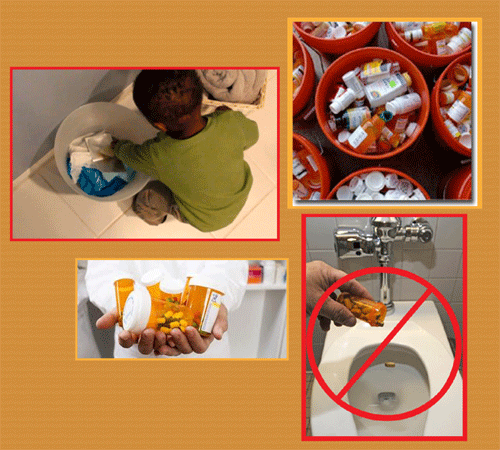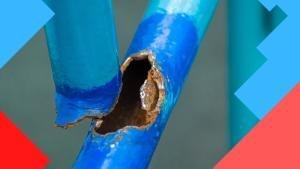THE CORRECT WAY TO DISPOSE OF HOUSEHOLD MEDICATIONS
80% of our rivers and streams are contaminated by pharmaceuticals. And many municipal water supplies in the US have been found to contain trace amounts of pharmaceuticals. Where does this come from? The answer is easy: the contamination comes from people flushing household medications – unused or expired prescription drugs – down the toilet or down the drain. Scientists have found hormones, antibiotics, and antidepressants present in the municipal water supply of many major cities.

Waste-water treatment does not specifically remove drugs from our waste-water. The effects of some drugs are reduced by waste-water treatment, while others are not. These drugs can cause harm to humans and wildlife who might drink contaminated water or bathe in it. It also harms fish, which in turn can harm humans if they eat those fish.
Most cities and counties in the US have Household Hazardous Waste Collections sites. But most of these sites usually do not accept pharmaceuticals. So what is a responsible consumer or conservationist to do?
Many states hold pharmaceutical collection events. These events must be approved by your state’s Department of Health. If you can locate one of these events occurring near your home or place of business, take your expired/unwanted pharmaceuticals there.
Other states have pharmaceutical collection centers. Still others operate medication collection boxes at law enforcement facilities. Find a suitable site near you and take your expired drugs there.
If you can’t locate a convenient collection event or center near you, you must dispose of your unwanted drugs properly. And there’s a right way and a wrong way of doing this.
Here’s how to dispose of medications correctly:
THE CORRECT METHOD OF DISPOSING OF USED DRUGS
- Treat your medications.
Firstly, you must first treat your pills and liquid medicines. You can do this by first adding water, and then adding substances like coffee grounds, ash, dirt – even cat litter. This will make the medicines unpalatable and less likely to be consumed. And do not conceal drugs in food: someone – a child or a pet – may accidentally eat them. - Hide the adulterated medications in another container.
When you have adulterated the drugs so that they are not edible, the next step is to put them in a container other than a pill bottle. Take a sealable bag or box, put the meds inside, and seal the bag or box with packing tape. Doing this prevents the medications from being easily accessible to humans or animals. - Disposing of needles and syringes.
Some medications require administering by a syringe or needle. These syringes and needles must be put in a puncture-proof container, then sealed with packing tape. Mark these containers as “sharps” and then place them in the trash. In many states, citizens are strongly advised to hand in their used sharpies at hospital-based sharps collection programs rather than placing them in the trash. - Place in the trash.
When you have taken care of the above steps, place the sealed package/s in the trash. Try to put these in the trash as close to trash-collection day as possible, to minimize the chance of a person or animal accessing them.
Never flush used or expired drugs or nutritional supplements down the toilet or down the drain. If you cannot locate an appropriate collection site, any hospital will take them off your hands – they know how to dispose of them properly. Alternatively, you can turn them over to your healthcare provider, doctor or veterinarian. They know how to deal with these dangerous substances safely.
A few more warnings:
- Chemotherapy drugs: if in capsule form, these should be taken to a collection site in its original container. If in liquid form, they should be returned to your healthcare provider.
- Mercury-containing devices: these cannot be accepted by medication collection sites. They should instead be taken to your county hazardous waste collection facility.
The FDA Says That These Drugs MUST Be Flushed:
Some medicines can be so harmful or even lethal if taken by someone other than the person prescribed them, that the FDA says you should flush those drugs down the drain or toilet in order to prevent them from getting into the wrong hands. The list of such drugs includes morphine, methadone, Oxycontin and Percocet. The FDA provides a complete list of those drugs that are too dangerous to be ingested by anyone but the patient described them and must be immediately flushed away when no longer needed. Follow this link for a complete list of these drugs from the FDA: http://1.usa.gov/1f0nGhX



